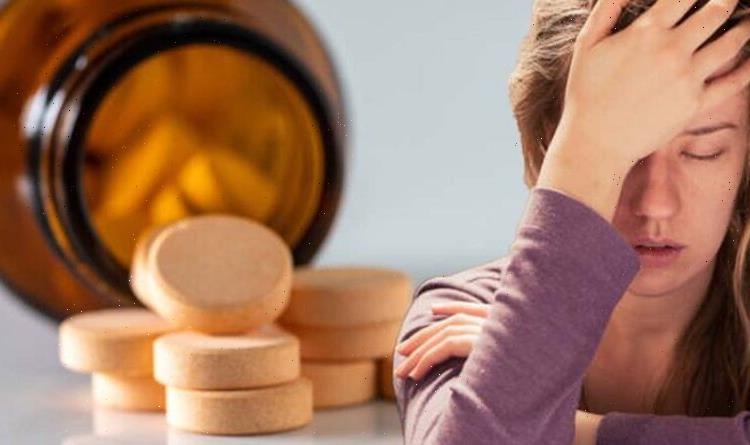Frankie Foster advises followers not to take diet supplements
We use your sign-up to provide content in ways you’ve consented to and to improve our understanding of you. This may include adverts from us and 3rd parties based on our understanding. You can unsubscribe at any time. More info
The NHS suggests side effects of taking high doses can occur when people consume more than 20mg. It adds that very high doses of iron can be fatal, particularly if taken by children, so always keep iron supplements out of the reach of children. Hemochromatosis, or iron overload, is a condition in which your body stores too much iron.
The National Institutes of Health (NIH) Office of Dietary Supplements (ODS) explains iron can be “harmful” if you get too much.
It states: In healthy people, taking high doses of iron supplements (especially on an empty stomach) can cause an upset stomach, constipation, nausea, abdominal pain, vomiting, and fainting.
“High doses of iron can also decrease zinc absorption. Extremely high doses of iron (in the hundreds or thousands of mg) can cause organ failure, coma, convulsions, and death.”
Some people have an inherited condition called hemochromatosis that causes toxic levels of iron to build up in their bodies.

The NIH notes the daily upper limits for iron include intakes from all sources, including food, beverages, and supplements.
Nonetheless, a doctor might prescribe more than the upper limit of iron to people who need higher doses for a while to treat iron deficiency.
The amount of iron you need differs between people. The NHS says that the amount of iron you need is 8.7mg a day for men over 18, 14.8mg a day for women aged 19 to 50, and 8.7mg a day for women over 50.
Iron deficiency anaemia is treated with iron tablets prescribed by a GP and by eating iron-rich foods.
A build-up of iron, known as iron overload, can cause unpleasant symptoms. If it is not treated, this can damage parts of the body such as the liver, joints, pancreas and heart.
Indeed, the Department of Health and Social Care advises that most people should be able to get all the iron they need by eating a varied and balanced diet.
The NHS says if blood tests show your red blood cell count is low, you’ll be prescribed iron tablets to replace the iron that’s missing from your body.
Although you can have too many iron supplements, there are also signs of deficiency to look out for.

Without adequate levels of iron, the red blood cells can’t effectively carry oxygen to the body’s tissues. If you do not eat enough foods containing iron, your iron levels may be low.
Non-prescribable food supplements are available over-the-counter and can be taken if an adequate iron intake is not being achieved
Many of the symptoms of iron deficiency can be mistaken for a normal part of the sometimes stressful lives we lead, such as tiredness and struggling to focus at work.
Iron anaemia symptoms include tiredness, shortness of breath, pale skin, and heart palpitations.

Treatment includes prescribed iron tablets and diet can play an important role in preventing and treating iron deficiency anaemia.
The richest source of iron in the diet includes meat and seafood and for this reason many vegans may suffer from an iron deficiency.
The NIH explains iron in food comes in two forms: heme iron and nonheme iron.
It states: “Nonheme iron is found in plant foods and iron-fortified food products. Meat, seafood, and poultry have both heme and nonheme iron.”
Source: Read Full Article
